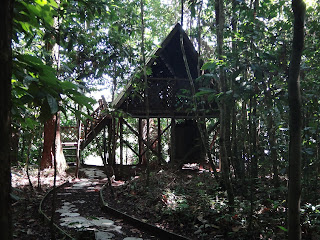The next morning we packed it all up and took boats down river to the Eco Camp, another part of the Kopel Community Eco-tourism. Here all students would be staying for the next couple of days, mostly in A frame huts, but some going all out sleeping in the jungle with only hammocks. I must say though that by this point I was very tired because of lack of sleep and hard working days. I decided to take the morning to visit a local museum and then head out with the lunch delivery later in the day. In the village there is a museum, whose name I can’t seem to remember or find, where 50 or so wooden coffins have been found in the caves of a limestone escarpment. It is a bit of a mystery what these coffins, date 600-900 years old, are doing in the caves as by that time locals in the area had converted to Islam which dictates no coffin or adornments at burial. It was an interesting place and from the top there is a lookout area with great views. After spending some time there I and another teacher rode out with the lunches to where the students were planting trees. Portions of the forest near the village had been illegally logged and so the Kopel group was replanting those areas. More work in the sun and the dirt planting and then we headed back to the Eco camp for the night. After a delicious dinner and a couple of hours of charades most everyone headed for bed. I was looking forward to a good night of sleep as there were no highways, chicken coups, or mosques in sight and my mat had a mosquito net over it. Unfortunately I had stupidly left an empty package of peanuts on the floor next to my bag and so was awoken at 4am by what I think was a lizard trying to lick the inside of the foil.
Day two at Eco camp I again decided to take the morning to rest, this time learning some local fishing techniques from the guides and chatting with them about their lives. Thankfully the other teacher with me was Malaysian and so could communicate with them very well. Not that they didn’t speak English, but the English was limited. I learned that most of the guys had 6-10 kids and earned between 200-400 ringgit (about 70-125usd) per month. To supplement their income they fished, hunted, tended vegetable patches, and grew small plots of palm for palm oil production. It was an interesting morning.
I again rode the boat out with the lunch and joined everyone else planting trees. By 4pm we broke from work and took a couple of boats down river to see some wildlife. That trip was rewarding as we saw some crocs, various hornbills, and proboscis monkeys. That night back at camp we had another great meal and prepared our bags for an early departure the next morning.



No comments:
Post a Comment